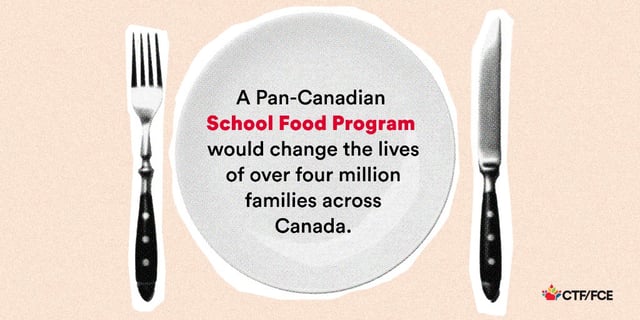$1B Secured for Canada's National School Food Program: A Major Win
The Canadian Teachers’ Federation and others brought $1 billion in federal funding to improve food security for students across the nation with the New/Mode V2 platform! Read on to learn about how it happened:
So what exactly is The National School Food Program?

The National School Food Program is a federal initiative that focuses on providing nutritious meals to students in schools. By ensuring that students have access to healthy and balanced meals, the program aims to support their overall well-being and academic performance.
The program works in collaboration with schools to ensure that every student has access to nutritious meals. It also promotes the importance of healthy eating habits and educates students about the benefits of a balanced diet. Through the National School Food Program, the government aims to address food insecurity among students and ensure that they have the necessary nutrition to thrive both in and outside the classroom.
Overview of the Campaigners

The Canadian Teachers’ Federation (CTF) is a prominent national organization representing over 300,000 teachers across Canada. Its mission is to promote high-quality public education, protect the rights of teachers, and advocate for policies that support the holistic development of students.
In recent years, the CTF has increasingly focused on the importance of student nutrition and its impact on learning. Recognizing the link between proper nutrition and academic performance, the CTF has been a strong advocate for the implementation of a National School Food Program. Partnered with the Breakfast Club of Canada and the Coalition for Healthy School Food, these organizations pushed towards improving food security for students across the nation.
Breakfast Club of Canada is a national non-profit organization dedicated to providing nutritious breakfasts to children across Canada. Founded in 1994, the organization aims to ensure that no child starts their day hungry, believing that a healthy breakfast is essential for students' academic success and overall well-being. The Breakfast Club of Canada works with schools and community partners to establish breakfast programs, reaching over 500,000 children in more than 3,500 schools nationwide. Their efforts not only combat food insecurity but also promote healthy eating habits and equal opportunities for all students to thrive.
The Coalition for Healthy School Food is a collective of over 160 organizations advocating for a universal, cost-shared, healthy school food program for all Canadian children and youth. Formed in 2013, the coalition's mission is to ensure that every student has access to nutritious, culturally appropriate meals at school. By working with governments, schools, and communities, the Coalition for Healthy School Food strives to implement policies and programs that address food insecurity, enhance student health, and improve educational outcomes. Their vision is to create a national school food program that supports the physical and cognitive development of every child in Canada.
How New/Mode's Platform Helped the Campaign

The New/Mode V2 platform played a crucial role in securing the $1 billion federal funding for the National School Food Program. It provided a user-friendly and efficient advocacy platform (which you can sign up for free here) that empowered individuals and organizations to voice their support for the program.
Through New/Mode's email tool, supporters of the National School Food Program were able to easily contact their elected representatives, urging them to prioritize funding for the program. The platform helped generate widespread awareness and support for the National School Food Program through campaign boosting. Overall, New/Mode mobilized individuals across the nation to take action and advocate for the importance of food security and nutrition in schools.
Details of the $1B Funding Allocation

The National School Food Program has secured $1 billion in federal funding, sparked by a campaign run by CTF on the New/Mode V2 platform. This significant funding allocation will be used to enhance the program's reach and impact, ensuring that more students across the nation can benefit from nutritious meals.
The funding will be allocated to schools based on various criteria, such as the number of students enrolled and the level of need within the community. It will allow schools to expand their food services, upgrade kitchen facilities, and hire additional staff to support the program's implementation.
Furthermore, the funding will also be utilized to improve the quality of meals provided, ensuring that students receive nutritious and well-balanced options. This includes sourcing fresh and local ingredients, accommodating dietary restrictions, and promoting healthy eating habits.
By expanding the program's reach, more students will have access to meals that meet their dietary needs and support their academic performance. This funding will help bridge the gap for students who rely on school meals as their primary source of nutrition, ensuring that they receive the nourishment they need to thrive.
Additionally, the funding will also create opportunities for schools to collaborate with local farmers and suppliers, supporting the local economy and promoting sustainable food practices. It will contribute to the development of a more resilient and inclusive food system, benefiting both students and the broader community.
So is it over? No Need for More Advocacy?
While the $1 billion federal funding is a significant milestone for the National School Food Program, advocacy efforts must continue to ensure the program's long-term success and sustainability.
Advocates can continue to engage with their elected representatives and policymakers to emphasize the importance of ongoing funding for the program. They can share success stories and data that demonstrate the positive impact of the National School Food Program on students' lives and academic outcomes.
Furthermore, advocates can collaborate with local communities and organizations to support initiatives that promote healthy eating habits and food security. By working together, they can create a comprehensive approach to address the root causes of food insecurity and ensure that all students have access to nutritious meals.
With continued advocacy efforts and collaboration, we can build a future where every student has access to nutritious meals, empowering them to reach their full potential.
Written by


